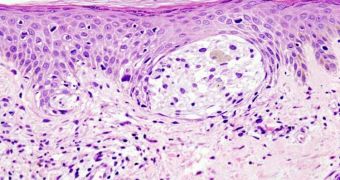Scientists at Katholieke Universiteit Leuven Laboratory of Molecular Cell Biology (VIB/KU Leuven) announce the discovery of a new avenue of research in developing an effective treatment against melanoma, a malignant and highly aggressive form of skin cancer.
One of the things that make melanoma so dangerous is the fact that it is able to withstand the effects of conventional chemotherapy. In other words, this approach triggers all the usual side-effects, with none of the expected patient benefits.
VIB/KU Leuven investigators Agnieszka Gembarska and Chris Marine took it upon themselves to come up with a new way of treating this condition. Their approach is focused on stopping and controlling the interactions between two specific molecules.
The interactions between the protein MDM4 and the tumor suppressing protein p53 are at the heart of melanoma, investigators say. Developing a drug to target their interactions could lead to the creation of a viable melanoma treatment.
Recently developed therapies, such as those based on BRAF inhibitors, are again confirmed by this research. The study shows that additional improvements could turn this approach into viable threats to skin cancers, Science Daily reports.
Details of the new research appear in the latest issue of the top scientific journal Nature Medicine. “Our results are important on two levels. From a scientific perspective, it is very important that we have been able to prove that p53 plays a key role in the formation of melanomas,” Marine says.
“However, this research also offers perspectives for optimizing the existing treatment strategies for melanomas. The current treatment with BRAF inhibitors has positive effects on nearly 80% of the patients, but many of them relapse after a few months,” he goes on to add.
“We may have discovered a way of preventing this relapse,” explains the researcher, who adds that the pharmaceutical industry will undoubtedly pick up this research, and carry it forward.
According to the research group, MDM4 inhibits the action of p53, which can no longer protect cells against cancer. By restoring optimal p53 levels, existing melanoma cells can be made more susceptible to the influences of both chemotherapy and BRAF inhibitor-based drugs.
“In our research, we were able to identify MDM4 as a very promising target for treatment of melanoma, as part of a combination therapy,” Marine concludes.

 14 DAY TRIAL //
14 DAY TRIAL //